An Analysis of Research Methodology for International Development Aid
VerifiedAdded on 2020/02/14
|10
|2709
|48
Report
AI Summary
This report provides a comprehensive overview of the research methodology employed to investigate international development aid, specifically focusing on the engagement of development funding agencies with GROs (Groups of Residents). The study begins with an introduction to research methodology, highlighting its importance in guiding the research process and ensuring the collection of relevant data. The report then delves into the research philosophy, adopting an interpretivism approach to explore subjective aspects and gain a deeper understanding of the context. The research design utilizes an exploratory case study method to examine the funding sources and development strategies of GROs. The research approach is inductive, allowing for the development of insights from the data collected. The research strategy employs a qualitative approach, utilizing thematic analysis to analyze data collected through interviews with directors/managers of GROs. Data collection methods include both primary (in-depth interviews) and secondary sources (journals, articles, books). Sampling techniques involve random and snowball sampling to gather opinions from key stakeholders. The report also addresses ethical considerations, emphasizing the importance of maintaining research ethics and ensuring the validity and reliability of the data. Finally, the report acknowledges research limitations that may impact the study's scope and findings.
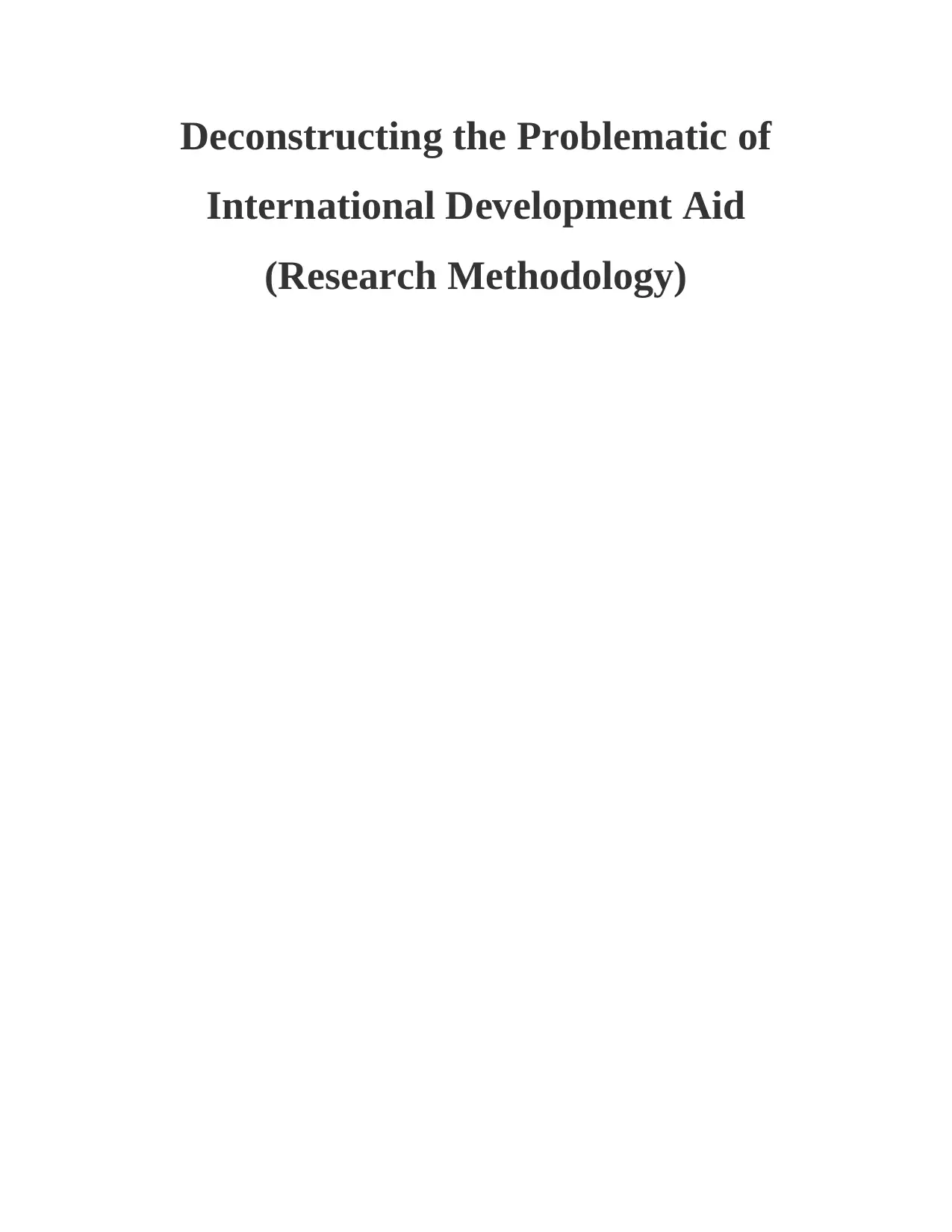
Deconstructing the Problematic of
International Development Aid
(Research Methodology)
International Development Aid
(Research Methodology)
Paraphrase This Document
Need a fresh take? Get an instant paraphrase of this document with our AI Paraphraser
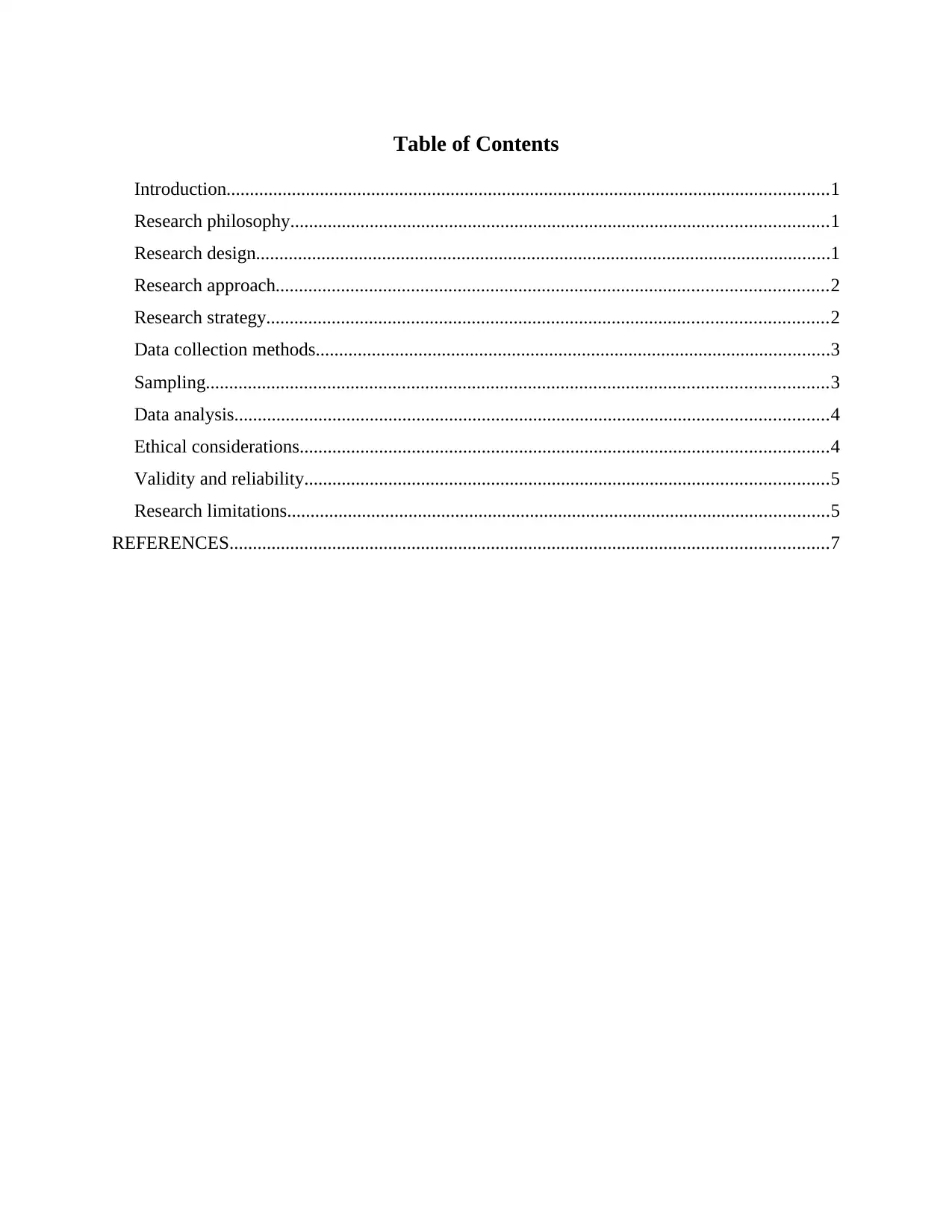
Table of Contents
Introduction.................................................................................................................................1
Research philosophy...................................................................................................................1
Research design...........................................................................................................................1
Research approach......................................................................................................................2
Research strategy........................................................................................................................2
Data collection methods..............................................................................................................3
Sampling.....................................................................................................................................3
Data analysis...............................................................................................................................4
Ethical considerations.................................................................................................................4
Validity and reliability................................................................................................................5
Research limitations....................................................................................................................5
REFERENCES................................................................................................................................7
Introduction.................................................................................................................................1
Research philosophy...................................................................................................................1
Research design...........................................................................................................................1
Research approach......................................................................................................................2
Research strategy........................................................................................................................2
Data collection methods..............................................................................................................3
Sampling.....................................................................................................................................3
Data analysis...............................................................................................................................4
Ethical considerations.................................................................................................................4
Validity and reliability................................................................................................................5
Research limitations....................................................................................................................5
REFERENCES................................................................................................................................7

⊘ This is a preview!⊘
Do you want full access?
Subscribe today to unlock all pages.

Trusted by 1+ million students worldwide
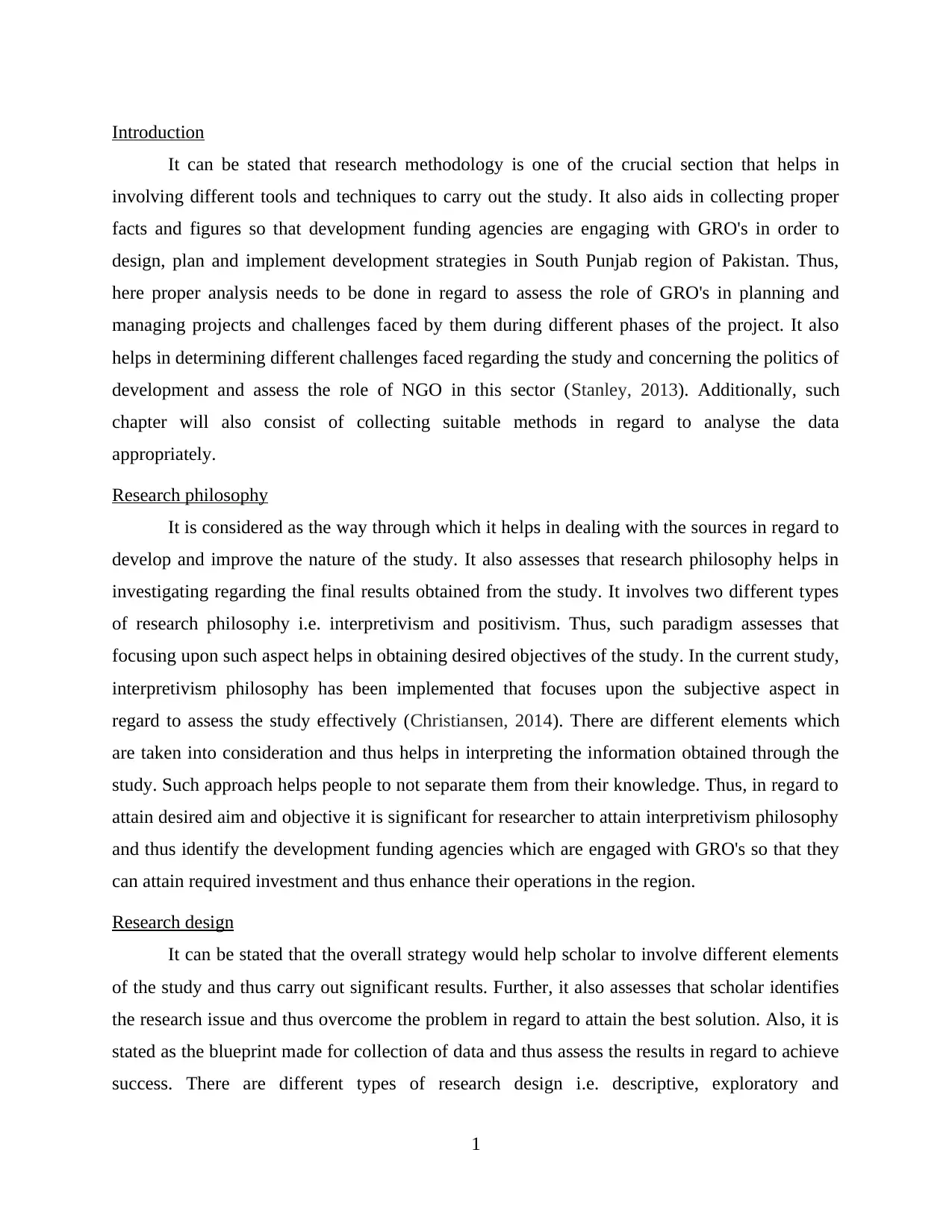
Introduction
It can be stated that research methodology is one of the crucial section that helps in
involving different tools and techniques to carry out the study. It also aids in collecting proper
facts and figures so that development funding agencies are engaging with GRO's in order to
design, plan and implement development strategies in South Punjab region of Pakistan. Thus,
here proper analysis needs to be done in regard to assess the role of GRO's in planning and
managing projects and challenges faced by them during different phases of the project. It also
helps in determining different challenges faced regarding the study and concerning the politics of
development and assess the role of NGO in this sector (Stanley, 2013). Additionally, such
chapter will also consist of collecting suitable methods in regard to analyse the data
appropriately.
Research philosophy
It is considered as the way through which it helps in dealing with the sources in regard to
develop and improve the nature of the study. It also assesses that research philosophy helps in
investigating regarding the final results obtained from the study. It involves two different types
of research philosophy i.e. interpretivism and positivism. Thus, such paradigm assesses that
focusing upon such aspect helps in obtaining desired objectives of the study. In the current study,
interpretivism philosophy has been implemented that focuses upon the subjective aspect in
regard to assess the study effectively (Christiansen, 2014). There are different elements which
are taken into consideration and thus helps in interpreting the information obtained through the
study. Such approach helps people to not separate them from their knowledge. Thus, in regard to
attain desired aim and objective it is significant for researcher to attain interpretivism philosophy
and thus identify the development funding agencies which are engaged with GRO's so that they
can attain required investment and thus enhance their operations in the region.
Research design
It can be stated that the overall strategy would help scholar to involve different elements
of the study and thus carry out significant results. Further, it also assesses that scholar identifies
the research issue and thus overcome the problem in regard to attain the best solution. Also, it is
stated as the blueprint made for collection of data and thus assess the results in regard to achieve
success. There are different types of research design i.e. descriptive, exploratory and
1
It can be stated that research methodology is one of the crucial section that helps in
involving different tools and techniques to carry out the study. It also aids in collecting proper
facts and figures so that development funding agencies are engaging with GRO's in order to
design, plan and implement development strategies in South Punjab region of Pakistan. Thus,
here proper analysis needs to be done in regard to assess the role of GRO's in planning and
managing projects and challenges faced by them during different phases of the project. It also
helps in determining different challenges faced regarding the study and concerning the politics of
development and assess the role of NGO in this sector (Stanley, 2013). Additionally, such
chapter will also consist of collecting suitable methods in regard to analyse the data
appropriately.
Research philosophy
It is considered as the way through which it helps in dealing with the sources in regard to
develop and improve the nature of the study. It also assesses that research philosophy helps in
investigating regarding the final results obtained from the study. It involves two different types
of research philosophy i.e. interpretivism and positivism. Thus, such paradigm assesses that
focusing upon such aspect helps in obtaining desired objectives of the study. In the current study,
interpretivism philosophy has been implemented that focuses upon the subjective aspect in
regard to assess the study effectively (Christiansen, 2014). There are different elements which
are taken into consideration and thus helps in interpreting the information obtained through the
study. Such approach helps people to not separate them from their knowledge. Thus, in regard to
attain desired aim and objective it is significant for researcher to attain interpretivism philosophy
and thus identify the development funding agencies which are engaged with GRO's so that they
can attain required investment and thus enhance their operations in the region.
Research design
It can be stated that the overall strategy would help scholar to involve different elements
of the study and thus carry out significant results. Further, it also assesses that scholar identifies
the research issue and thus overcome the problem in regard to attain the best solution. Also, it is
stated as the blueprint made for collection of data and thus assess the results in regard to achieve
success. There are different types of research design i.e. descriptive, exploratory and
1
Paraphrase This Document
Need a fresh take? Get an instant paraphrase of this document with our AI Paraphraser
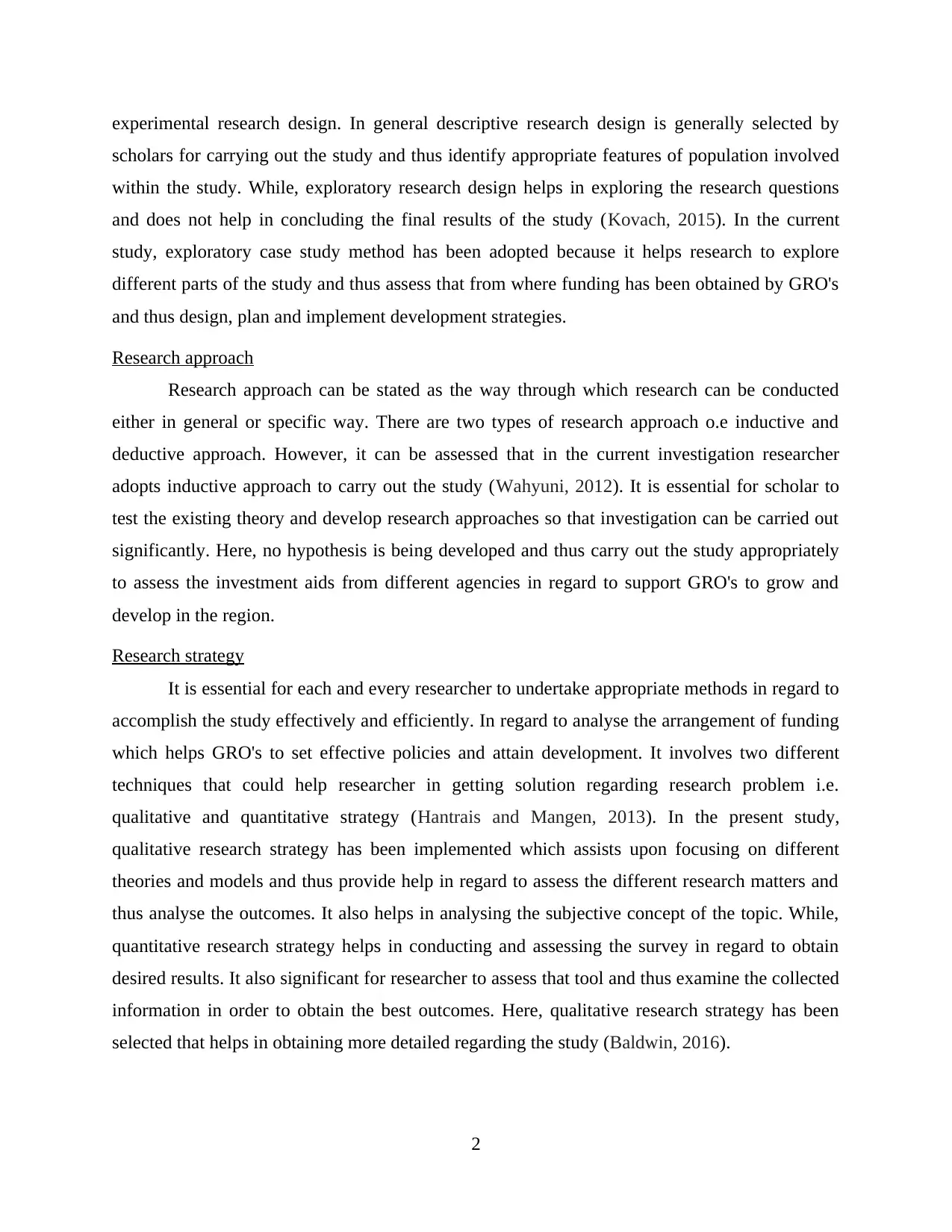
experimental research design. In general descriptive research design is generally selected by
scholars for carrying out the study and thus identify appropriate features of population involved
within the study. While, exploratory research design helps in exploring the research questions
and does not help in concluding the final results of the study (Kovach, 2015). In the current
study, exploratory case study method has been adopted because it helps research to explore
different parts of the study and thus assess that from where funding has been obtained by GRO's
and thus design, plan and implement development strategies.
Research approach
Research approach can be stated as the way through which research can be conducted
either in general or specific way. There are two types of research approach o.e inductive and
deductive approach. However, it can be assessed that in the current investigation researcher
adopts inductive approach to carry out the study (Wahyuni, 2012). It is essential for scholar to
test the existing theory and develop research approaches so that investigation can be carried out
significantly. Here, no hypothesis is being developed and thus carry out the study appropriately
to assess the investment aids from different agencies in regard to support GRO's to grow and
develop in the region.
Research strategy
It is essential for each and every researcher to undertake appropriate methods in regard to
accomplish the study effectively and efficiently. In regard to analyse the arrangement of funding
which helps GRO's to set effective policies and attain development. It involves two different
techniques that could help researcher in getting solution regarding research problem i.e.
qualitative and quantitative strategy (Hantrais and Mangen, 2013). In the present study,
qualitative research strategy has been implemented which assists upon focusing on different
theories and models and thus provide help in regard to assess the different research matters and
thus analyse the outcomes. It also helps in analysing the subjective concept of the topic. While,
quantitative research strategy helps in conducting and assessing the survey in regard to obtain
desired results. It also significant for researcher to assess that tool and thus examine the collected
information in order to obtain the best outcomes. Here, qualitative research strategy has been
selected that helps in obtaining more detailed regarding the study (Baldwin, 2016).
2
scholars for carrying out the study and thus identify appropriate features of population involved
within the study. While, exploratory research design helps in exploring the research questions
and does not help in concluding the final results of the study (Kovach, 2015). In the current
study, exploratory case study method has been adopted because it helps research to explore
different parts of the study and thus assess that from where funding has been obtained by GRO's
and thus design, plan and implement development strategies.
Research approach
Research approach can be stated as the way through which research can be conducted
either in general or specific way. There are two types of research approach o.e inductive and
deductive approach. However, it can be assessed that in the current investigation researcher
adopts inductive approach to carry out the study (Wahyuni, 2012). It is essential for scholar to
test the existing theory and develop research approaches so that investigation can be carried out
significantly. Here, no hypothesis is being developed and thus carry out the study appropriately
to assess the investment aids from different agencies in regard to support GRO's to grow and
develop in the region.
Research strategy
It is essential for each and every researcher to undertake appropriate methods in regard to
accomplish the study effectively and efficiently. In regard to analyse the arrangement of funding
which helps GRO's to set effective policies and attain development. It involves two different
techniques that could help researcher in getting solution regarding research problem i.e.
qualitative and quantitative strategy (Hantrais and Mangen, 2013). In the present study,
qualitative research strategy has been implemented which assists upon focusing on different
theories and models and thus provide help in regard to assess the different research matters and
thus analyse the outcomes. It also helps in analysing the subjective concept of the topic. While,
quantitative research strategy helps in conducting and assessing the survey in regard to obtain
desired results. It also significant for researcher to assess that tool and thus examine the collected
information in order to obtain the best outcomes. Here, qualitative research strategy has been
selected that helps in obtaining more detailed regarding the study (Baldwin, 2016).
2
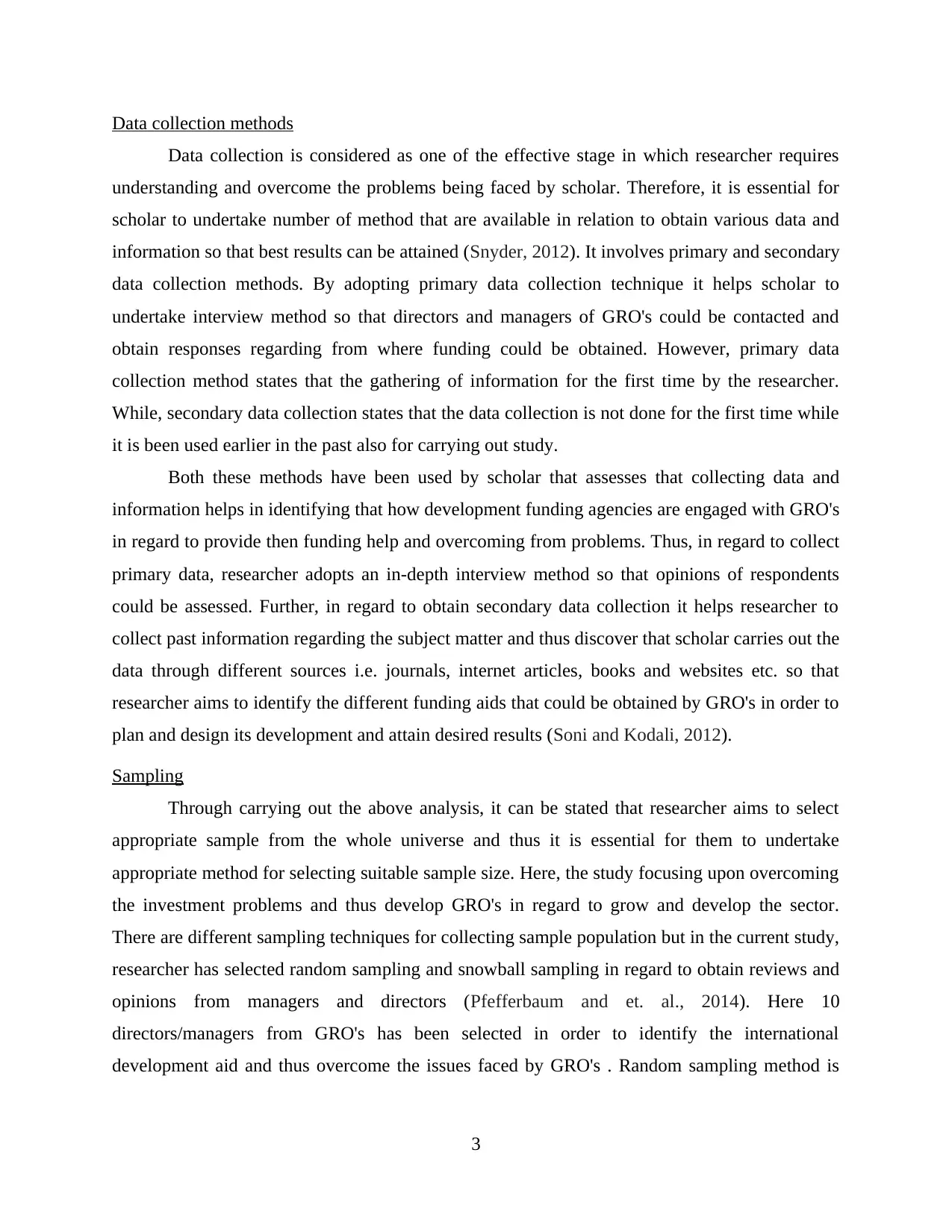
Data collection methods
Data collection is considered as one of the effective stage in which researcher requires
understanding and overcome the problems being faced by scholar. Therefore, it is essential for
scholar to undertake number of method that are available in relation to obtain various data and
information so that best results can be attained (Snyder, 2012). It involves primary and secondary
data collection methods. By adopting primary data collection technique it helps scholar to
undertake interview method so that directors and managers of GRO's could be contacted and
obtain responses regarding from where funding could be obtained. However, primary data
collection method states that the gathering of information for the first time by the researcher.
While, secondary data collection states that the data collection is not done for the first time while
it is been used earlier in the past also for carrying out study.
Both these methods have been used by scholar that assesses that collecting data and
information helps in identifying that how development funding agencies are engaged with GRO's
in regard to provide then funding help and overcoming from problems. Thus, in regard to collect
primary data, researcher adopts an in-depth interview method so that opinions of respondents
could be assessed. Further, in regard to obtain secondary data collection it helps researcher to
collect past information regarding the subject matter and thus discover that scholar carries out the
data through different sources i.e. journals, internet articles, books and websites etc. so that
researcher aims to identify the different funding aids that could be obtained by GRO's in order to
plan and design its development and attain desired results (Soni and Kodali, 2012).
Sampling
Through carrying out the above analysis, it can be stated that researcher aims to select
appropriate sample from the whole universe and thus it is essential for them to undertake
appropriate method for selecting suitable sample size. Here, the study focusing upon overcoming
the investment problems and thus develop GRO's in regard to grow and develop the sector.
There are different sampling techniques for collecting sample population but in the current study,
researcher has selected random sampling and snowball sampling in regard to obtain reviews and
opinions from managers and directors (Pfefferbaum and et. al., 2014). Here 10
directors/managers from GRO's has been selected in order to identify the international
development aid and thus overcome the issues faced by GRO's . Random sampling method is
3
Data collection is considered as one of the effective stage in which researcher requires
understanding and overcome the problems being faced by scholar. Therefore, it is essential for
scholar to undertake number of method that are available in relation to obtain various data and
information so that best results can be attained (Snyder, 2012). It involves primary and secondary
data collection methods. By adopting primary data collection technique it helps scholar to
undertake interview method so that directors and managers of GRO's could be contacted and
obtain responses regarding from where funding could be obtained. However, primary data
collection method states that the gathering of information for the first time by the researcher.
While, secondary data collection states that the data collection is not done for the first time while
it is been used earlier in the past also for carrying out study.
Both these methods have been used by scholar that assesses that collecting data and
information helps in identifying that how development funding agencies are engaged with GRO's
in regard to provide then funding help and overcoming from problems. Thus, in regard to collect
primary data, researcher adopts an in-depth interview method so that opinions of respondents
could be assessed. Further, in regard to obtain secondary data collection it helps researcher to
collect past information regarding the subject matter and thus discover that scholar carries out the
data through different sources i.e. journals, internet articles, books and websites etc. so that
researcher aims to identify the different funding aids that could be obtained by GRO's in order to
plan and design its development and attain desired results (Soni and Kodali, 2012).
Sampling
Through carrying out the above analysis, it can be stated that researcher aims to select
appropriate sample from the whole universe and thus it is essential for them to undertake
appropriate method for selecting suitable sample size. Here, the study focusing upon overcoming
the investment problems and thus develop GRO's in regard to grow and develop the sector.
There are different sampling techniques for collecting sample population but in the current study,
researcher has selected random sampling and snowball sampling in regard to obtain reviews and
opinions from managers and directors (Pfefferbaum and et. al., 2014). Here 10
directors/managers from GRO's has been selected in order to identify the international
development aid and thus overcome the issues faced by GRO's . Random sampling method is
3
⊘ This is a preview!⊘
Do you want full access?
Subscribe today to unlock all pages.

Trusted by 1+ million students worldwide
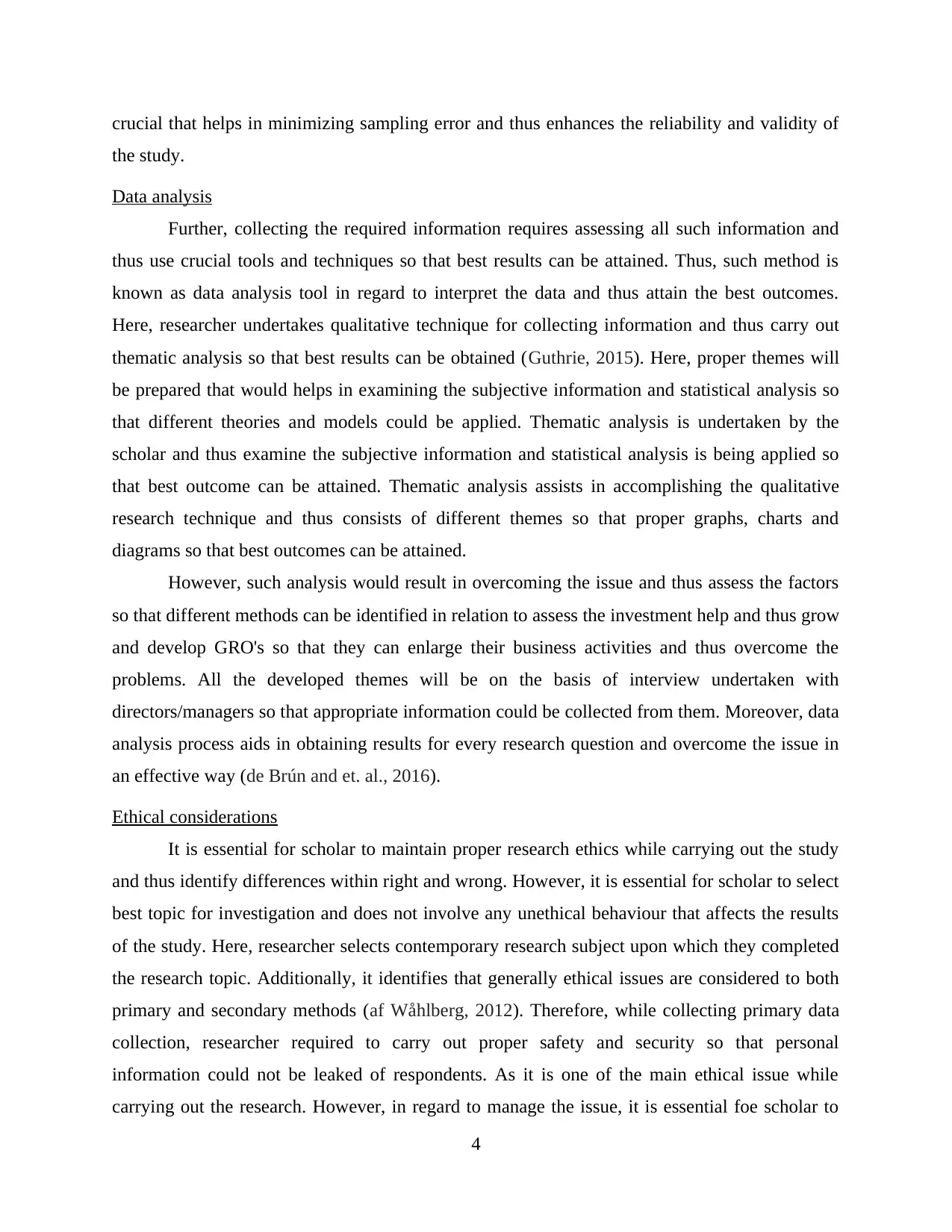
crucial that helps in minimizing sampling error and thus enhances the reliability and validity of
the study.
Data analysis
Further, collecting the required information requires assessing all such information and
thus use crucial tools and techniques so that best results can be attained. Thus, such method is
known as data analysis tool in regard to interpret the data and thus attain the best outcomes.
Here, researcher undertakes qualitative technique for collecting information and thus carry out
thematic analysis so that best results can be obtained (Guthrie, 2015). Here, proper themes will
be prepared that would helps in examining the subjective information and statistical analysis so
that different theories and models could be applied. Thematic analysis is undertaken by the
scholar and thus examine the subjective information and statistical analysis is being applied so
that best outcome can be attained. Thematic analysis assists in accomplishing the qualitative
research technique and thus consists of different themes so that proper graphs, charts and
diagrams so that best outcomes can be attained.
However, such analysis would result in overcoming the issue and thus assess the factors
so that different methods can be identified in relation to assess the investment help and thus grow
and develop GRO's so that they can enlarge their business activities and thus overcome the
problems. All the developed themes will be on the basis of interview undertaken with
directors/managers so that appropriate information could be collected from them. Moreover, data
analysis process aids in obtaining results for every research question and overcome the issue in
an effective way (de Brún and et. al., 2016).
Ethical considerations
It is essential for scholar to maintain proper research ethics while carrying out the study
and thus identify differences within right and wrong. However, it is essential for scholar to select
best topic for investigation and does not involve any unethical behaviour that affects the results
of the study. Here, researcher selects contemporary research subject upon which they completed
the research topic. Additionally, it identifies that generally ethical issues are considered to both
primary and secondary methods (af Wåhlberg, 2012). Therefore, while collecting primary data
collection, researcher required to carry out proper safety and security so that personal
information could not be leaked of respondents. As it is one of the main ethical issue while
carrying out the research. However, in regard to manage the issue, it is essential foe scholar to
4
the study.
Data analysis
Further, collecting the required information requires assessing all such information and
thus use crucial tools and techniques so that best results can be attained. Thus, such method is
known as data analysis tool in regard to interpret the data and thus attain the best outcomes.
Here, researcher undertakes qualitative technique for collecting information and thus carry out
thematic analysis so that best results can be obtained (Guthrie, 2015). Here, proper themes will
be prepared that would helps in examining the subjective information and statistical analysis so
that different theories and models could be applied. Thematic analysis is undertaken by the
scholar and thus examine the subjective information and statistical analysis is being applied so
that best outcome can be attained. Thematic analysis assists in accomplishing the qualitative
research technique and thus consists of different themes so that proper graphs, charts and
diagrams so that best outcomes can be attained.
However, such analysis would result in overcoming the issue and thus assess the factors
so that different methods can be identified in relation to assess the investment help and thus grow
and develop GRO's so that they can enlarge their business activities and thus overcome the
problems. All the developed themes will be on the basis of interview undertaken with
directors/managers so that appropriate information could be collected from them. Moreover, data
analysis process aids in obtaining results for every research question and overcome the issue in
an effective way (de Brún and et. al., 2016).
Ethical considerations
It is essential for scholar to maintain proper research ethics while carrying out the study
and thus identify differences within right and wrong. However, it is essential for scholar to select
best topic for investigation and does not involve any unethical behaviour that affects the results
of the study. Here, researcher selects contemporary research subject upon which they completed
the research topic. Additionally, it identifies that generally ethical issues are considered to both
primary and secondary methods (af Wåhlberg, 2012). Therefore, while collecting primary data
collection, researcher required to carry out proper safety and security so that personal
information could not be leaked of respondents. As it is one of the main ethical issue while
carrying out the research. However, in regard to manage the issue, it is essential foe scholar to
4
Paraphrase This Document
Need a fresh take? Get an instant paraphrase of this document with our AI Paraphraser
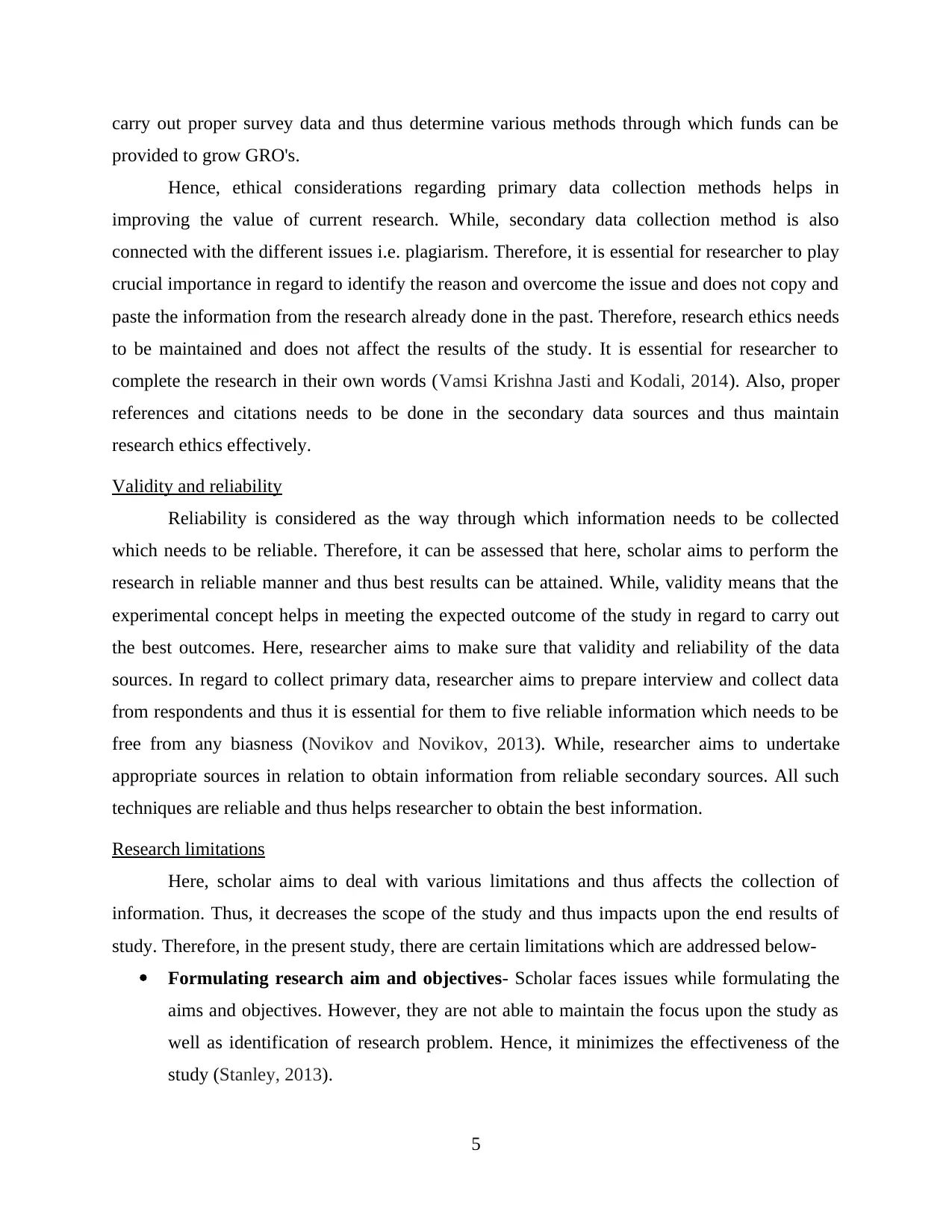
carry out proper survey data and thus determine various methods through which funds can be
provided to grow GRO's.
Hence, ethical considerations regarding primary data collection methods helps in
improving the value of current research. While, secondary data collection method is also
connected with the different issues i.e. plagiarism. Therefore, it is essential for researcher to play
crucial importance in regard to identify the reason and overcome the issue and does not copy and
paste the information from the research already done in the past. Therefore, research ethics needs
to be maintained and does not affect the results of the study. It is essential for researcher to
complete the research in their own words (Vamsi Krishna Jasti and Kodali, 2014). Also, proper
references and citations needs to be done in the secondary data sources and thus maintain
research ethics effectively.
Validity and reliability
Reliability is considered as the way through which information needs to be collected
which needs to be reliable. Therefore, it can be assessed that here, scholar aims to perform the
research in reliable manner and thus best results can be attained. While, validity means that the
experimental concept helps in meeting the expected outcome of the study in regard to carry out
the best outcomes. Here, researcher aims to make sure that validity and reliability of the data
sources. In regard to collect primary data, researcher aims to prepare interview and collect data
from respondents and thus it is essential for them to five reliable information which needs to be
free from any biasness (Novikov and Novikov, 2013). While, researcher aims to undertake
appropriate sources in relation to obtain information from reliable secondary sources. All such
techniques are reliable and thus helps researcher to obtain the best information.
Research limitations
Here, scholar aims to deal with various limitations and thus affects the collection of
information. Thus, it decreases the scope of the study and thus impacts upon the end results of
study. Therefore, in the present study, there are certain limitations which are addressed below-
Formulating research aim and objectives- Scholar faces issues while formulating the
aims and objectives. However, they are not able to maintain the focus upon the study as
well as identification of research problem. Hence, it minimizes the effectiveness of the
study (Stanley, 2013).
5
provided to grow GRO's.
Hence, ethical considerations regarding primary data collection methods helps in
improving the value of current research. While, secondary data collection method is also
connected with the different issues i.e. plagiarism. Therefore, it is essential for researcher to play
crucial importance in regard to identify the reason and overcome the issue and does not copy and
paste the information from the research already done in the past. Therefore, research ethics needs
to be maintained and does not affect the results of the study. It is essential for researcher to
complete the research in their own words (Vamsi Krishna Jasti and Kodali, 2014). Also, proper
references and citations needs to be done in the secondary data sources and thus maintain
research ethics effectively.
Validity and reliability
Reliability is considered as the way through which information needs to be collected
which needs to be reliable. Therefore, it can be assessed that here, scholar aims to perform the
research in reliable manner and thus best results can be attained. While, validity means that the
experimental concept helps in meeting the expected outcome of the study in regard to carry out
the best outcomes. Here, researcher aims to make sure that validity and reliability of the data
sources. In regard to collect primary data, researcher aims to prepare interview and collect data
from respondents and thus it is essential for them to five reliable information which needs to be
free from any biasness (Novikov and Novikov, 2013). While, researcher aims to undertake
appropriate sources in relation to obtain information from reliable secondary sources. All such
techniques are reliable and thus helps researcher to obtain the best information.
Research limitations
Here, scholar aims to deal with various limitations and thus affects the collection of
information. Thus, it decreases the scope of the study and thus impacts upon the end results of
study. Therefore, in the present study, there are certain limitations which are addressed below-
Formulating research aim and objectives- Scholar faces issues while formulating the
aims and objectives. However, they are not able to maintain the focus upon the study as
well as identification of research problem. Hence, it minimizes the effectiveness of the
study (Stanley, 2013).
5
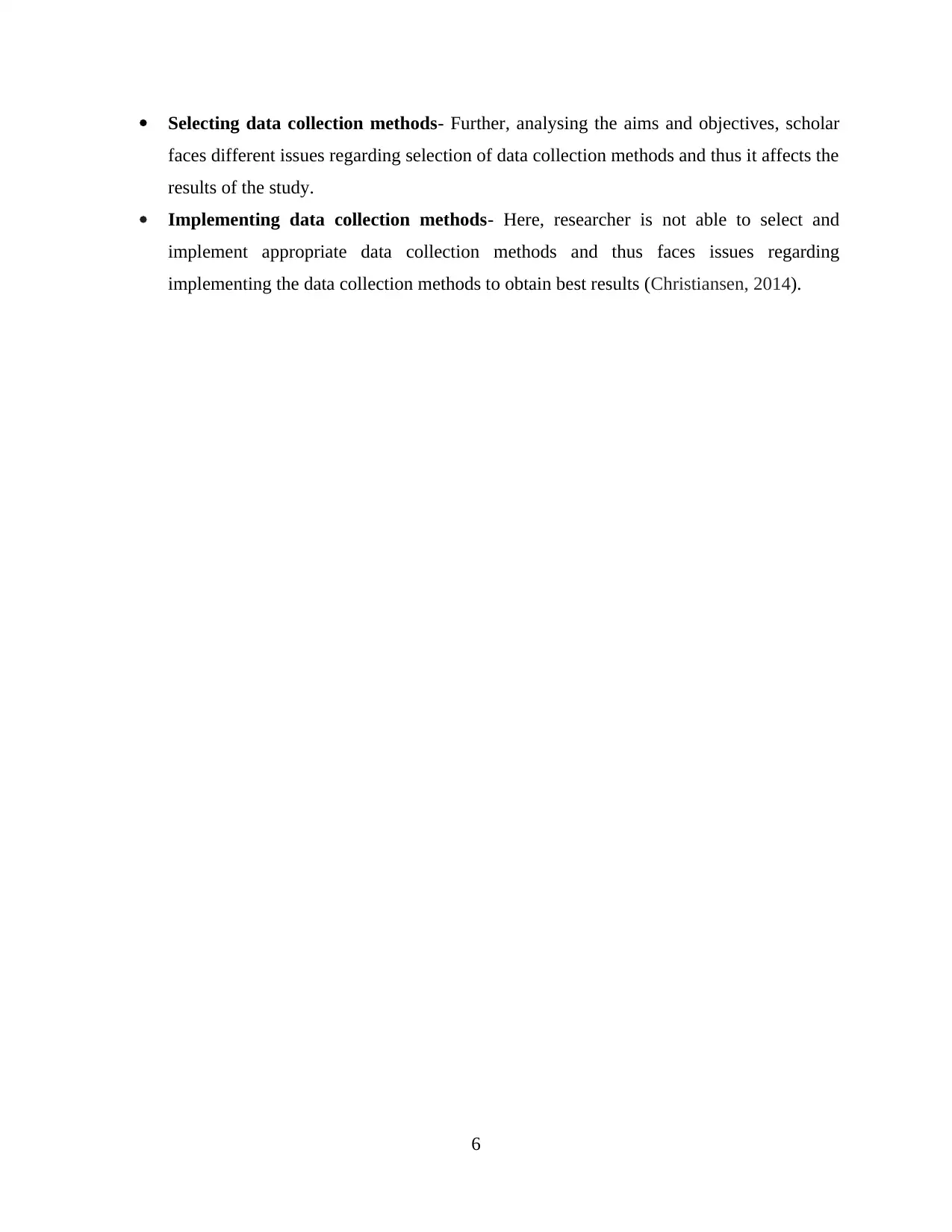
Selecting data collection methods- Further, analysing the aims and objectives, scholar
faces different issues regarding selection of data collection methods and thus it affects the
results of the study.
Implementing data collection methods- Here, researcher is not able to select and
implement appropriate data collection methods and thus faces issues regarding
implementing the data collection methods to obtain best results (Christiansen, 2014).
6
faces different issues regarding selection of data collection methods and thus it affects the
results of the study.
Implementing data collection methods- Here, researcher is not able to select and
implement appropriate data collection methods and thus faces issues regarding
implementing the data collection methods to obtain best results (Christiansen, 2014).
6
⊘ This is a preview!⊘
Do you want full access?
Subscribe today to unlock all pages.

Trusted by 1+ million students worldwide
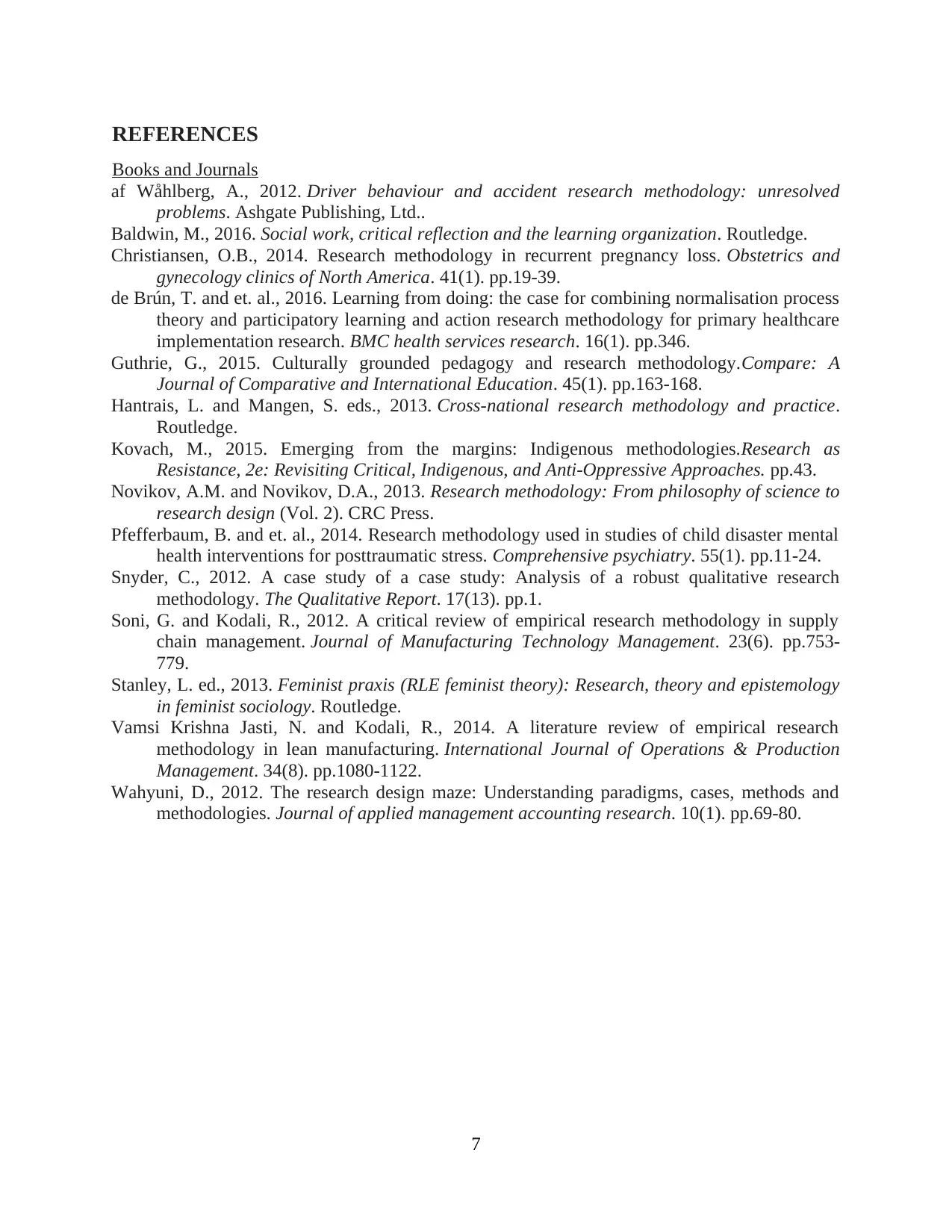
REFERENCES
Books and Journals
af Wåhlberg, A., 2012. Driver behaviour and accident research methodology: unresolved
problems. Ashgate Publishing, Ltd..
Baldwin, M., 2016. Social work, critical reflection and the learning organization. Routledge.
Christiansen, O.B., 2014. Research methodology in recurrent pregnancy loss. Obstetrics and
gynecology clinics of North America. 41(1). pp.19-39.
de Brún, T. and et. al., 2016. Learning from doing: the case for combining normalisation process
theory and participatory learning and action research methodology for primary healthcare
implementation research. BMC health services research. 16(1). pp.346.
Guthrie, G., 2015. Culturally grounded pedagogy and research methodology.Compare: A
Journal of Comparative and International Education. 45(1). pp.163-168.
Hantrais, L. and Mangen, S. eds., 2013. Cross-national research methodology and practice.
Routledge.
Kovach, M., 2015. Emerging from the margins: Indigenous methodologies.Research as
Resistance, 2e: Revisiting Critical, Indigenous, and Anti-Oppressive Approaches. pp.43.
Novikov, A.M. and Novikov, D.A., 2013. Research methodology: From philosophy of science to
research design (Vol. 2). CRC Press.
Pfefferbaum, B. and et. al., 2014. Research methodology used in studies of child disaster mental
health interventions for posttraumatic stress. Comprehensive psychiatry. 55(1). pp.11-24.
Snyder, C., 2012. A case study of a case study: Analysis of a robust qualitative research
methodology. The Qualitative Report. 17(13). pp.1.
Soni, G. and Kodali, R., 2012. A critical review of empirical research methodology in supply
chain management. Journal of Manufacturing Technology Management. 23(6). pp.753-
779.
Stanley, L. ed., 2013. Feminist praxis (RLE feminist theory): Research, theory and epistemology
in feminist sociology. Routledge.
Vamsi Krishna Jasti, N. and Kodali, R., 2014. A literature review of empirical research
methodology in lean manufacturing. International Journal of Operations & Production
Management. 34(8). pp.1080-1122.
Wahyuni, D., 2012. The research design maze: Understanding paradigms, cases, methods and
methodologies. Journal of applied management accounting research. 10(1). pp.69-80.
7
Books and Journals
af Wåhlberg, A., 2012. Driver behaviour and accident research methodology: unresolved
problems. Ashgate Publishing, Ltd..
Baldwin, M., 2016. Social work, critical reflection and the learning organization. Routledge.
Christiansen, O.B., 2014. Research methodology in recurrent pregnancy loss. Obstetrics and
gynecology clinics of North America. 41(1). pp.19-39.
de Brún, T. and et. al., 2016. Learning from doing: the case for combining normalisation process
theory and participatory learning and action research methodology for primary healthcare
implementation research. BMC health services research. 16(1). pp.346.
Guthrie, G., 2015. Culturally grounded pedagogy and research methodology.Compare: A
Journal of Comparative and International Education. 45(1). pp.163-168.
Hantrais, L. and Mangen, S. eds., 2013. Cross-national research methodology and practice.
Routledge.
Kovach, M., 2015. Emerging from the margins: Indigenous methodologies.Research as
Resistance, 2e: Revisiting Critical, Indigenous, and Anti-Oppressive Approaches. pp.43.
Novikov, A.M. and Novikov, D.A., 2013. Research methodology: From philosophy of science to
research design (Vol. 2). CRC Press.
Pfefferbaum, B. and et. al., 2014. Research methodology used in studies of child disaster mental
health interventions for posttraumatic stress. Comprehensive psychiatry. 55(1). pp.11-24.
Snyder, C., 2012. A case study of a case study: Analysis of a robust qualitative research
methodology. The Qualitative Report. 17(13). pp.1.
Soni, G. and Kodali, R., 2012. A critical review of empirical research methodology in supply
chain management. Journal of Manufacturing Technology Management. 23(6). pp.753-
779.
Stanley, L. ed., 2013. Feminist praxis (RLE feminist theory): Research, theory and epistemology
in feminist sociology. Routledge.
Vamsi Krishna Jasti, N. and Kodali, R., 2014. A literature review of empirical research
methodology in lean manufacturing. International Journal of Operations & Production
Management. 34(8). pp.1080-1122.
Wahyuni, D., 2012. The research design maze: Understanding paradigms, cases, methods and
methodologies. Journal of applied management accounting research. 10(1). pp.69-80.
7
1 out of 10
Related Documents
Your All-in-One AI-Powered Toolkit for Academic Success.
+13062052269
info@desklib.com
Available 24*7 on WhatsApp / Email
![[object Object]](/_next/static/media/star-bottom.7253800d.svg)
Unlock your academic potential
Copyright © 2020–2026 A2Z Services. All Rights Reserved. Developed and managed by ZUCOL.





